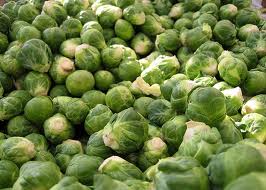(This is part of an ongoing series called Foods YOU Need!)
I am a huge fan of the vegetables in the cruciferous family and NO, it is not for their flavor! They truly are unique in their health and life-giving components! They fight cancer and are also high in fiber and vitamins and minerals. If the healthy info doesn’t interest you, no biggie. Just scroll down to the bottom to get some FABULOUS new recipes to help you get more of this good stuff!
CRUCIFEROUS VEGETABLES:
Arugula, Bok Choy, Broccoli, Broccoli Sprouts, Brussels Sprouts, Cabbage, Cauliflower, Chard, Collard Greens, Daikon, Kale, Kohlrabi, Mustard Greens, Radishes, Rutabagas, Turnips , and Watercress.
I bolded the cruciferous vegetables above that I use often in my daily 64oz “Green Smoothie.” And YES, there are still some veggies that I am afraid to try! So know that even I have to go slow sometimes. Take your time adding these to your daily smoothie in small amounts and think of the below health benefits as you drink!
1. Antioxidants: We hear so much about antioxidants helping to fight all kinds of problems, such as cancer, heart disease, and aging. Antioxidants do this by strengthening the cell membranes and keeping DNA healthy. Cruciferous veggie are loaded with anti-oxidants such as beta-carotene and the compound sulforaphane, which has been shown in lab tests to neutralize carcinogens (that cause cancer) before they can damage DNA.
2. Glucosinolates: Cruciferous vegetables are different from other classes of vegetables in that they contain rich sources of sulfur-containing phytochemicals known as glucosinolates. When these glucosinolates are broken down by chewing or blending, a compound called indole-3-carbinol results. This compound has been shown to activate enzymes that eliminate carcinogens, encourage DNA repair, and induce cancer cell apoptosis (die-off.) Indole-3-carbinol also blocks estrogen receptor sites on the membranes of breast and other reproductive cell cancers, such as cervical and prostate. Some studies have also shown a beneficial effect on the treatment of certain skin cancers.
3. Isothiocyanate: The phytochemical known as isothiocyanate is also found in cruciferous vegetables. This is another compound that is released through the chewing or breaking down of the vegetable. It is also responsible for the distinct “green” taste of cruciferous vegetables. It has shown evidence of inducing cancer cell apoptosis and slowing tumor growth and cell proliferation (or division.)
So now for the practical stuff. How can you add more cruciferous vegetables to your diet?
Here’s how I do it: First of all, you want to eat all veggies raw as much as possible, but some recipes I have below call for a little bit of cooking.
Raw Broccoli Baked Sweet Potatoes
2-3 sweet potatoes
1 -2 crowns raw broccoli
Directions: Bake sweet potatoes on 350 degrees for 30-45 minutes. Let cool. Remove peel. Place raw broccoli in food processor. Blend until well chopped. Add potatoes and blend until well mixed. ENJOY! (My daughter Ruby-Claire LOVES this one!)
Romaine Strawberry Salad with Broccoli Sprouts
In my opinion, broccoli sprouts are the healthiest, cancer-fighting veggie out there! I put these little guys in my smoothie as much as they are available, but if you’re the salad eating type, try this one!
1 bunch romaine
8-10 chopped strawberries
Golf ball sized pinch of broccoli sprouts
Chopped yellow pepper
Cooked lentils or black beans
Cooked quinoa
Annie’s Naturals Papaya Poppyseed Dressing
With cruciferous veggies, just remember to chew well! Many of the cancer-fighting healthy properties are released through well chewed food. Enjoy!


Some people who have Hashimoto’s Disease should not eat raw cruciferous vegetables, only lightly steamed and occasionally.
Thanks for letting us all know! (:
Nielsen’s Serious Raw Green Vegetable Drink, sold it most Whole Food Markets in Northern California, a great product.
most nutritious raw whole food dark green cruciferous vegetable drink on the market. this drink is not a juice, it’s blended in its entirety and
sold in most Whole Food Markets in Northern California.
Looks great Cortney. Do you grow your own broccoli sprouts? If not, where do you buy them? I have a hard time finding them where I live. Thanks! Keep up the good work! Pam
Hi Pam! I buy my broccoli sprouts at our local farmer’s market, Whole Foods, or even Publix has had them before. The only brand I have ever been able to find is called “Brocco Sprouts.” HTH!